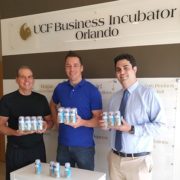Orlando Startup Manufactures Novel Solution to Help Prevent Serious Illness and Death Among Bottle-Fed Infants
Orlando, Fla. –Ready Made, a startup company in the University of Central Florida Business Incubation Program, has developed a novel solution to help prevent serious illness and death among bottle-fed infants. The Orlando-based business announced today that it has manufactured samples of the world’s first ready-to-serve (RTS) baby bottle, which will be sent to humanitarian and disaster relief organizations, hospital administrators and pediatricians, strategic partners and potential investors for feedback and support.
While other manufacturers already sell ready-to-feed (RTF) liquid formulas and sterile baby bottles, all current methods require some form of assembly on the part of the caregiver. Assembling a baby bottle is not just an inconvenience to those on the receiving end of a hungry, screaming infant, but the parts responsible for feeding the child can easily become cross contaminated with harmful and potentially deadly germs and bacteria during the preparation, handling and storage process.
The Ready Made bottle requires no filling, preparation, or assembly by the caregiver, thus eliminating the risk of cross contamination by the feeder. This bacteria-free process is accomplished through the company’s patented valve technology, which is incorporated into the capping system. This unique capping system allows the caregiver to open the container without having to touch the food source or any of the parts responsible for feeding the child.
The product is a one-time-use recyclable baby bottle pre-filled with sterile liquid formula, which does not require refrigeration and will stay fresh and bacteria free for 12 months. The Centers for Disease Control and Prevention (CDC) encourages caregivers to use liquid infant formula over its powdered counterpart, as manufacturers are unable to get rid of all germs in powered infant formula, including Cronobacter, which although rare, is deadly to young infants.
According to Ready Made’s founder and chief engineer, Corwin Littell, Ph.D., “the user simply removes the safety cap, feeds the infant and then recycles the container. Whether administered in hospitals, homes or humanitarian and disaster relief sites, the Ready Made bottle provides infants with a safe and convenient meal. I’m very proud to be a part of this life-saving product.”
Foodborne pathogens can cause debilitating infections and severe diarrhea. According to the World Health Organization (WHO), every year, 220 million children world-wide contract diarrheal diseases and 96,000 die. While there are a myriad of reasons for those staggering figures, unhygienic bottle safety practices and unclean food and water sources for infants are contributors. While both WHO and the CDC encourage caregivers to follow safety guidelines, busy and exhausted feeders can often forget, skimp, or skip recommended measures of hygiene. Bottle safety and hygiene becomes increasingly difficult in underdeveloped countries or natural disaster sites, where sterile water isn’t readily available to clean bottles or mix with powered infant formulas.
“The Ready Made bottle will be the answer to some of the issues we face when feeding babies not only in third world countries, but in our own,” said Maria Corena McLeod, Ph.D., former director of newborn screening for the Florida Department of Health, who was the first recipient of a sample Ready Made bottle. “It will facilitate rescue efforts and humanitarian operations where sanitary conditions and access to clean water are scarce or non-existent. In addition, the bottle could be filled with different kinds of formula providing a delivery system for children with special dietary requirements. The Ready Made Bottle will save many lives.”
Ready Made expects to have their bottle available for humanitarian and commercial use within the next 12 months. The company also plans to fill their proprietary containers with other food sources and oral electrolyte solutions.
For more information about Ready Made, visit www.readymadeinc.com.
Ready Made is a client company of the University of Central Florida Business Incubator in Orlando.
# # #
For more information, contact:
Corwin Littell, Ph.D., Founder, Ready Made Inc., 407-492-2617, CorwinL@readymadeinc.com.
Michael Weiss, Site Manager, UCF Business Incubator-Orlando, 321-281-8384, Michael.Weiss@ucf.edu.
About Ready Made Inc.
Ready Made has developed and patented the first fully single-use ready-to-serve baby bottle. Current options for infant bottles require sterilization, mixing, filling and assembly. The Ready Made baby bottle requires no assembly and is pre-filled with liquid ready-to-feed (RTF) infant formula and is packaged bacteria free at the factory. With our special technology, the RTF formula can flow into the teat simply by removing the pressurized cap. By eliminating the need for handling and assembly, we also eliminate bacteria, a threat to infants, especially those in humanitarian and disaster relief areas.
About the University of Central Florida Business Incubation Program:
The University of Central Florida Business Incubation Program is a community resource that provides early-stage companies with the tools, training and infrastructure to become financially stable, high growth / impact enterprises. Since 1999, this award-winning program has helped hundreds of local startup companies reach their potential faster by providing vital business development resources.
With seven facilities throughout the region, the UCF Business Incubation Program is an economic development partnership between the University of Central Florida, the Corridor, Orange, Osceola, Seminole and Volusia Counties, and the cities of Apopka, Kissimmee, Orlando and Winter Springs. Participating companies sustain more than 3,600 local jobs and have had a total impact of $1.51 Billion on regional sales and $2.48 Billion on regional economic output. During the last fiscal year, the program has returned $7.95 for every $1.00 invested in the program. Visit www.incubator.ucf.edu.






